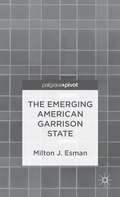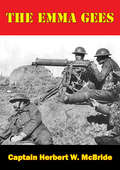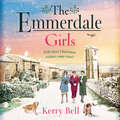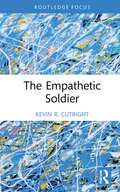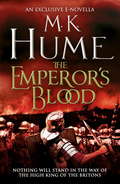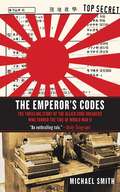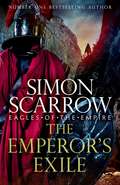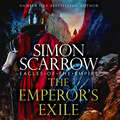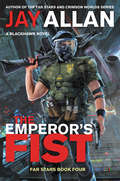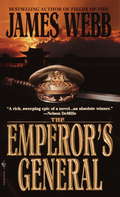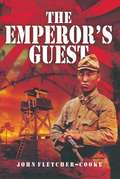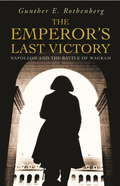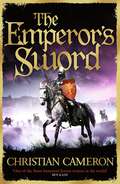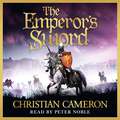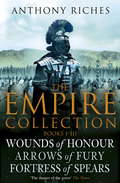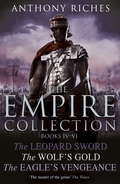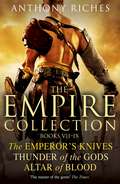- Table View
- List View
The Emerging American Garrison State
by Milton J. EsmanThis book describes and analyzes the emergence of the American global empire and the role of the garrison state in protecting the threatened homeland and defending the declining imperium.
The Emma Gees [Illustrated Edition]
by Captain Herbert W. McBrideIncludes the First World War Illustrations Pack - 73 battle plans and diagrams and 198 photosThe classic account of sniping on the Western Front."Herbert Wesley McBride was a Captain in the Twenty-first Battalion, Canadian Expeditionary Force, during the First World War. He was a sniper and commander of a machine gun unit known as the "Emma Gees." He was also the author of two books on the war: "A Rifleman Went To War" (1933) and "The Emma Gees" (1918)...When the war started, he volunteered in a Canadian rifle company in Ottawa because he wanted to see action as quickly as possible. He was commissioned as an officer, but was reduced to a private due to several drunken incidents. He shipped to England for training and then to the Western Front, where he participated in battles around Ypres and the Somme throughout 1916. In his book, "A Rifleman Went To War," he recounts killing more than 100 German soldiers as a sniper. This book is highly regarded by students of riflery, it's mandatory reading in the U.S. Marine Corps Sniping School. It is also considered one of the best first-person accounts of World War I, often being compared favorably to "Storm of Steel" by Ernst Junger. However McBride notes in his book that by the end of 1916 he felt in his heart "the game was over," and a series of alcoholic binges resulted in his court martial and dismissal from the Canadian Expeditionary Force in February 1917. He then joined the United States Army's 38th Division, serving out the war as a marksmanship and sniping instructor at Camp Perry. He resigned in October 1918. After the war, he worked in the lumber industry in Oregon for most of his later years. He died in Indianapolis of a sudden heart failure on March 17, 1933, shortly after finishing "A Rifleman Went To War." He was 60."-Canadaatwar.com
The Emmerdale Girls: an uplifting and romantic read perfect for winter nights in
by Kerry BellThe perfect Christmas gift full of drama and romance, for fans of ITV's Emmerdale and readers who love hopeful stories set in the past.December 1944, and the residents of Beckindale can't believe they're going through another wartime Christmas. Though the success of the D-Day landings earlier in the year has brought some hope to the village. The women of Emmerdale are navigating their own lives, loves and dream and as the war draws to a close, and they realise things will never be the same again. The Emmerdale girls are going to learn things are never dull where love is involved.Exploring the lives of Emmerdale's much-loved families during World War II, including favourites such as the Sugdens and the Dingles, The Emmerdale Girls is a hopeful and nostalgic novel about community, friendship and love.Readers love the Emmerdale fiction books!'Absolutely loved this novel, combining the nostalgia of classic Emmerdale as currently seen on itv3 with the Sugdens, Tates and even Seth and Betty with the heart of a wartime saga novel.' Reader review 'Beautifully written... the perfect Sunday afternoon read.' Reader review 'True fans will delight in the references to their favourite locations, characters and hints of later storylines.' Reader review 'Heartwarming, sensitive and packed with drama.' Reader review
The Empathetic Soldier (War, Conflict and Ethics)
by Kevin R. CutrightThis book shows the contribution that empathy can and should make to the proper conduct of war. US Army doctrine identifies empathy as an essential trait in soldiers; despite this endorsement of senior leaders, empathy’s role in the military profession remains obscure. The notion of soldiers empathetically considering others, especially enemies, strikes many as counter to the nature of soldiering. Additionally, confusion caused by differing definitions of empathy often leads to its complete dismissal. This work clarifies the concept by considering recent philosophical, psychological, and neuroscientific research, and demonstrates the relevance of empathy to the tactical and strategic demands of war. Empathy amplifies soldiers’ understanding of human actors in an operational environment, enables soldiers’ critical and creative thinking, and improves their overall intentions, planning, and assessments of a war’s progress. While empathy can make soldiers more susceptible to the psychic wound of moral injury, it also helps prevent and overcome this injury. Instead of dismissing it, soldiers should assimilate empathy into their moral frameworks. This book will be of much interest to students of the ethics of war, psychology, and military studies generally.
The Emperor's Blood (e-novella): A gripping short story of battles and bloodshed
by M. K. HumeNothing will stand in the way of the High King of the Britons...A gripping e-novella that brings the dramatic battle between the High King of Briton, Magnus Maximus, and the Roman Emperor, Gratian, vividly to life. The Emperor's Blood is M.K. Hume's untold adventure from The Blood of Kings (Tintagel Book I). Not to be missed by fans of Simon Scarrow and Ian Ross. In the dying days of Roman rule, Magnus Maximus casts his eyes on the throne of the Western Empire and with a band of brave Roman and British warriors he marches to Gaul and challenges the might of Rome itself...What readers are saying about M.K. Hume's novels: 'M.K. Hume is one of my favourite authors - a fantastic series''Well drawn characters with the right balance of plot and action. A great addition to historical fiction''M.K. Hume brings not only her characters to life but also the sights and sounds of battle'
The Emperor's Codes: The Thrilling Story of the Allied Code Breakers Who Turned the Tide of World War II
by Michael SmithIn this gripping, previously untold story from World War II, Michael Smith examines how code breakers cracked Japan's secret codes and won the war in the Pacific. He also takes the reader step by step through the process, explaining exactly how the code breakers went about their daunting task-made even more difficult by the vast linguistic differences between Japanese and English. The Emperor's Codes moves across the world from Bletchley Park to Pearl Harbor, from Singapore to Colombo, and from Mombasa to Melbourne. It tells the stories of John Tiltman, the British soldier turned code breaker who made many of the early breaks in Japanese diplomatic and military codes; Commander Joe Rochedort, the leading expert on Japanese in U.S. naval intelligence; Eric Nave, the Australian sailor who pioneered breakthroughs in deciphering Japanese naval codes; and Oshima Hiroshi, the hard-drinking Japanese ambassador to Berlin whose candid, often verbose reports to Tokyo of his conversations with Hitler and other high-ranking Nazis were a major source of intelligence in the war against Germany. Without the dedication demonstrated by these relatively unsung heroes, the outcome of World War II might have been very different.
The Emperor's Exile (Eagles of the Empire 19): The thrilling Sunday Times bestseller
by Simon ScarrowThe Sunday Times bestseller - a thrilling new adventure in Simon Scarrow's acclaimed Eagles of the Empire series. Perfect for readers of Conn Iggulden and Bernard Cornwell. READERS CAN'T GET ENOUGH OF SIMON SCARROW'S BOOKS!'I could not put it down' ***** - AMAZON REVIEW'Awesome read . . . ' ***** - AMAZON REVIEW'A storytelling master . . . I loved this novel and can't wait for the next' ***** - AMAZON REVIEW'If you have read the previous books, you already know how good they are . . . If you have not read any of these books, then get started!' ***** - AMAZON REVIEWA.D. 57. Battle-scarred veterans of the Roman army Tribune Cato and Centurion Macro return to Rome. Thanks to the failure of their recent campaign on the eastern frontier they face a hostile reception at the imperial court. Their reputations and future are at stake. When Emperor Nero's infatuation with his mistress is exploited by political enemies, he reluctantly banishes her into exile. Cato, isolated and unwelcome in Rome, is forced to escort her to Sardinia. Arriving on the restless, simmering island with a small cadre of officers, Cato faces peril on three fronts: a fractured command, a deadly plague spreading across the province...and a violent insurgency threatening to tip the province into blood-stained chaos. IF YOU DON'T KNOW SIMON SCARROW, YOU DON'T KNOW ROME!MORE PRAISE FOR SIMON SCARROW'S NOVELS'Scarrow's [novels] rank with the best'Independent'Blood, gore, political intrigue'Daily Sport'Always a joy' The Times
The Emperor's Exile (Eagles of the Empire 19): The thrilling Sunday Times bestseller
by Simon ScarrowThe gripping and action-packed new Roman army adventure in the Eagles of the Empire series by Sunday Times bestselling author Simon Scarrow. The perfect read for readers of Conn Iggulden and Bernard Cornwell. Tribune Cato and Centurion Macro, hardened veterans of the Roman army, have faced the Empire's enemies from Britannia to Parthia, from Hispania to Judea. Now once again they are on a mission that will imperil their lives and those of all who serve with them. Loyal to the last to their comrades in battle, fearless in the face of the most brutal or barbaric opponents, they are the finest men the Emperor can call on in the service of Rome. IF YOU DON'T KNOW SIMON SCARROW, YOU DON'T KNOW ROME!Praise for Simon's novels:'Scarrow's [novels] rank with the best' Independent'Blood, gore, political intrigue' Daily Sport 'Always a joy' The Times(P)2020 Headline Publishing Group Ltd
The Emperor's Exile: The thrilling Sunday Times bestseller (Eagles Of The Empire Ser.)
by Simon ScarrowThe Sunday Times bestseller - a thrilling new adventure in Simon Scarrow's acclaimed Eagles of the Empire series. Perfect for readers of Conn Iggulden and Bernard Cornwell. READERS CAN'T GET ENOUGH OF SIMON SCARROW'S BOOKS!'I could not put it down' ***** - AMAZON REVIEW'Awesome read . . . ' ***** - AMAZON REVIEW'A storytelling master . . . I loved this novel and can't wait for the next' ***** - AMAZON REVIEW'If you have read the previous books, you already know how good they are . . . If you have not read any of these books, then get started!' ***** - AMAZON REVIEWA.D. 57. Battle-scarred veterans of the Roman army Tribune Cato and Centurion Macro return to Rome. Thanks to the failure of their recent campaign on the eastern frontier they face a hostile reception at the imperial court. Their reputations and future are at stake. When Emperor Nero's infatuation with his mistress is exploited by political enemies, he reluctantly banishes her into exile. Cato, isolated and unwelcome in Rome, is forced to escort her to Sardinia. Arriving on the restless, simmering island with a small cadre of officers, Cato faces peril on three fronts: a fractured command, a deadly plague spreading across the province...and a violent insurgency threatening to tip the province into blood-stained chaos. IF YOU DON'T KNOW SIMON SCARROW, YOU DON'T KNOW ROME!MORE PRAISE FOR SIMON SCARROW'S NOVELS'Scarrow's [novels] rank with the best' Independent'Blood, gore, political intrigue' Daily Sport'Always a joy' The Times
The Emperor's Fist: A Blackhawk Novel (Far Stars #4)
by Jay AllanIn this thrilling new installment in the Far Stars saga, a reluctant hero with a bloody past must reunite with an old love to battle an evil emperor willing to destroy all their worlds if he cannot control them.When the Far Stars came under imperial attack, Astra Lucerne—the daughter and successor of the Far Stars’ greatest conqueror—Marshal Augustin Lucerne—rallied her father’s confederation forces to defend their worlds. They were joined in the fight by former imperial general Arkarin Blackhawk, a warrior whose skills and brutality made him infamous, and who has, for two decades, sought the redemption he knows is unreachable. Now, with the imperial foothold in the sector eliminated, the Far Stars is free and almost united. While Astra’s forces continue to depose local tyrants and warlords, Ark and his crew have slipped back into the shadows. Though his heart belongs to Astra, Ark cannot get too close. His imperial conditioning remains under control, but it is still volatile, and the temptation of power threatens to unleash the dark compulsions that made him the most merciless of the emperor’s servants. He cannot risk allowing Astra to see the darkness inside him.But while the battle has been won, the war may not be over. A petty smuggler makes a discovery that can enable the emperor to strike back and crush the resistance—unless Ark and Astra join forces again to stop him.
The Emperor's General
by James WebbCaptain Jay Marsh had never questioned where his ultimate loyalty lay. He had witnessed the bloody horror left behind by the retreating Japanese army during World War II's final days. And he had abandoned his beautiful Filipina fiancée to see his duty through.But not even Marsh could guess the terrible personal price he would have to pay for his loyalty. He would follow General Douglas MacArthur to Tokyo itself. There he would become the brilliant, egocentric general's confidant, translator, surrogate son--and spy.Marsh would play a dangerous game of deliberate deceit and brutal injustice in the shadow world of postwar Japan's royal palaces and geisha houses, and recognize that the defeated emperor and his wily aides were exploiting MacArthur's ruthless ambition to become the American Caesar. The Emperor's General is a dramatic human story of the loss of innocence and the seduction of power, about the conflict between honor, duty, and love, all set against an extraordinary historical backdrop.From the Paperback edition.
The Emperor's General
by James WebbCaptain Jay Marsh had never questioned where his ultimate loyalty lay. He had witnessed the bloody horror left behind by the retreating Japanese army during World War II's final days. And he had abandoned his beautiful Filipina fiancée to see his duty through.But not even Marsh could guess the terrible personal price he would have to pay for his loyalty. He would follow General Douglas MacArthur to Tokyo itself. There he would become the brilliant, egocentric general's confidant, translator, surrogate son--and spy.Marsh would play a dangerous game of deliberate deceit and brutal injustice in the shadow world of postwar Japan's royal palaces and geisha houses, and recognize that the defeated emperor and his wily aides were exploiting MacArthur's ruthless ambition to become the American Caesar. The Emperor's General is a dramatic human story of the loss of innocence and the seduction of power, about the conflict between honor, duty, and love, all set against an extraordinary historical backdrop.From the Paperback edition.
The Emperor's Guest
by John Fletcher-CookeSeen through the eyes of John Fletcher-Cooke, the horrifying, but by now often-told story of the treatment meted out by the Japanese to their prisoners of war takes on an entirely new light. His is a book written without bitterness but at the same time a book which does not look back on suffering shared in the self-congratulatory spirit of an old comrades reunion. For Sir John has two remarkable advantages, one possible unique and the other certainly very rare. Firstly, throughout his captivity he kept a diary on which this book is based, and which, as the reader will discover, he was almost unbelievably lucky to preserve. Secondly, as the reader will discover by reading between the lines, he never for one moment gave way to despair.During his years as a prisoner of war he witnessed and was subjected to a wider spectrum of mans inhumanity to man then he could have expected to experience had Torquemada himself been his tutor. To say the he emerged from his descent into hell a wiser and better man is not to condone is suffering. It only emphasizes the fact that indomitable courage and great strength of character are often revealed only in adversity.Sir John subsequently revisited Japan and the places where he was imprisoned. He also met some of the men who had once been his persecutors. The final chapters of this very remarkable book reveal once again the humanity, compassion and understanding which enabled him to survive when so many others died.
The Emperor's Last Victory: Napoleon And The Battle Of Wagram
by Gunther E RothenbergA leading expert examines one of Napoleon's most decisive but least analysed victoriesIn early July 1809 Napoleon crossed the Danube with 187,000 men to confront the Austrian Archduke Charles and an army of 145,000 men. The fighting that followed dwarfed in intensity and scale any previous Napoleonic battlefield, perhaps any in history: casualties on each side were over 30,000. The Austrians fought with great determination, but eventually the Emperor won a narrow victory. Wagram was decisive in that it compelled Austria to make peace. It also heralded a new, altogether greater order of warfare, anticipating the massed manpower and weight of fire deployed much later in the battles of the American Civil War and then at Verdun and on the Somme.
The Emperor's Last Victory: Napoleon and the Battle of Wagram
by Gunther E RothenbergA leading expert examines one of Napoleon's most decisive but least analysed victoriesIn early July 1809 Napoleon crossed the Danube with 187,000 men to confront the Austrian Archduke Charles and an army of 145,000 men. The fighting that followed dwarfed in intensity and scale any previous Napoleonic battlefield, perhaps any in history: casualties on each side were over 30,000. The Austrians fought with great determination, but eventually the Emperor won a narrow victory. Wagram was decisive in that it compelled Austria to make peace. It also heralded a new, altogether greater order of warfare, anticipating the massed manpower and weight of fire deployed much later in the battles of the American Civil War and then at Verdun and on the Somme.
The Emperor's Sword: Japan vs. Russia in the Battle of Tsushima
by Noel F. Busch"On this one battle rests the fate of our nation. Let every man do his utmost." From the bridge of his flagship, Mikasa, Admiral Togo signaled the beginning of the battle, standing near the forward rail, his body thrust forward in the determined stance of some classic Japanese war god. A tiny, Napoleonic figure-barely five feet, three inches tall, and weighing less than 130 pounds -Togo carried his Zeiss binoculars(one of three pairs in Japan) and wore his magnificent ceremonial sword, its gold-encrusted scabbard nearly touching the deck. The sword was a gift from Togo's deified Emperor, and symbolized Japan's new drive to world power by domination of the Eastern seas. The Japanese Fleet was drawn up in the Strait of Tsushima between Japan and Korea. A long smudge of smoke on the southern horizon signaled the approach of the Imperial Russian Ships. On the outcome of the Battle of Tsushima depended the fate of Japan and-ultimately-the fate of the U.S. Fleet at Pearl Harbor. One hundred years after Trafalgar, on May 27, 1905, Togo met Rozhdestvensky, Imperial Russia against Imperial Japan, with most of the long- range firepower and weight on the Russian side. This battle would decide world policy in the Pacific for decades to come. The Emperor's Sword is a violent chronicle of war and death at sea, of diplomatic intrigue, heroism, cowardice, stupidity, international politics, and individual tragedy. The backbone of the Russian Second Pacific Squadron were four new battleships, top-heavy and slow. The armada totaled forty-two vessels. Many if not most of the seamen were bitterly hostile to their officers; the crews were untrained conscripts. When Rozhdestvensky lined up his squadron to face Togo, he had already survived an eighteen-thousand-mile journey, mutiny, lack of fuel, a shortage of ammunition, and a series of mishaps that had won his armada the name of "the mad dog fleet." Noel Busch weaves the complex strands of history into a gripping, absorbing narrative of The Emperor's Sword. As history, as adventure tale, and as sobering analysis of the part played by hazard in deciding defeat or victory, The Emperor's Sword is a fascinating chronicle by a master historian- storyteller.
The Emperor's Sword: Pre-order the brand new adventure in the Chivalry series! (Chivalry #6)
by Christian CameronThe penultimate instalment in the Chivalry series from a master of historical fiction.The Chivalry series follows young William Gold, who runs away from London to follow the Black Prince, from the killing fields of France, through life as a routier and criminal, and to redemption with the Knights of Saint John, further disillusion and an eventual career as a professional soldier and knight. Rich in the details of life in the High Middle Ages, the series also deals with modern issues about the role of violence in society, rules of conflict and war, and the price that people pay for using violence.'One of the finest historical fiction writers in the world' BEN KANE'The master of historical fiction' SUNDAY TIMES'A storyteller at the height of his powers' HISTORICAL NOVEL SOCIETY
The Emperor's Sword: Pre-order the brand new adventure in the Chivalry series! (Chivalry #6)
by Christian CameronThe penultimate instalment in the Chivalry series from a master of historical fiction.The Chivalry series follows young William Gold, who runs away from London to follow the Black Prince, from the killing fields of France, through life as a routier and criminal, and to redemption with the Knights of Saint John, further disillusion and an eventual career as a professional soldier and knight. Rich in the details of life in the High Middle Ages, the series also deals with modern issues about the role of violence in society, rules of conflict and war, and the price that people pay for using violence.'One of the finest historical fiction writers in the world' BEN KANE'The master of historical fiction' SUNDAY TIMES'A storyteller at the height of his powers' HISTORICAL NOVEL SOCIETY
The Emperor's Sword: Pre-order the brand new adventure in the Chivalry series! (Chivalry #6)
by Christian CameronThe penultimate instalment in the Chivalry series from a master of historical fiction.The Chivalry series follows young William Gold, who runs away from London to follow the Black Prince, from the killing fields of France, through life as a routier and criminal, and to redemption with the Knights of Saint John, further disillusion and an eventual career as a professional soldier and knight. Rich in the details of life in the High Middle Ages, the series also deals with modern issues about the role of violence in society, rules of conflict and war, and the price that people pay for using violence.'One of the finest historical fiction writers in the world' BEN KANE'The master of historical fiction' SUNDAY TIMES'A storyteller at the height of his powers' HISTORICAL NOVEL SOCIETY
The Empire Collection Volume I: Wounds of Honour, Arrows of Fury, Fortress of Spears
by Anthony RichesThe first three stories in Anthony Riches' thrilling EMPIRE series, now available in one page-turning collection, including Wounds of Honour, Arrows of Fury and Fortress of Spears.Wounds of HonourMarcus Aquila has scarcely landed in Britannia when he has to run for his life - condemned to dishonorable death by power-crazed emperor Commodus. The plan is to take a new name, serve in an obscure regiment on Hadrian's Wall and lie low until he can hope for justice. Then a rebel army sweeps down from north of the Wall, and Marcus has to prove he's tough enough to lead a century in the front line of a brutal war.Arrows of FuryThe new Roman governor of Britannia must stamp out the northern rebellion or risk losing the province. For Marcus - Centurion Corvus of the 1st Tungrians - the campaign has become doubly dangerous. As reinforcements flood into Britannia he is surrounded by new officers with no reason to protect him. Death could result from a careless word as easily as from an enemy spear. Worse, one of them is close on his heels. The prefect of the 2nd Tungrians has discovered his secret. Only a miracle can save Marcus from disgrace and death . . .Fortress of SpearsMarcus Aquila - burning for revenge on an enemy that has killed one of his best friends - rides north with the Petriana cavalry. He believes his disguise as Centurion Corvus of the 2nd Tungrians is still holding. But he is just a few days ahead of two of the emperor's agents, sent from Rome to kill him. Pitiless assassins who know his real name, and too much about his friends.
The Empire Collection Volume I: Wounds of Honour, Arrows of Fury, Fortress of Spears
by Anthony RichesThe first three stories in Anthony Riches' bestselling EMPIRE series, now available in one page-turning collectionIncluding Wounds of Honour, Arrows of Fury and Fortress of Spears.Wounds of HonourMarcus Aquila has scarcely landed in Britannia when he has to run for his life - condemned to dishonorable death by power-crazed emperor Commodus. The plan is to take a new name, serve in an obscure regiment on Hadrian's Wall and lie low until he can hope for justice. Then a rebel army sweeps down from north of the Wall, and Marcus has to prove he's tough enough to lead a century in the front line of a brutal war.Arrows of FuryThe new Roman governor of Britannia must stamp out the northern rebellion or risk losing the province. For Marcus - Centurion Corvus of the 1st Tungrians - the campaign has become doubly dangerous. As reinforcements flood into Britannia he is surrounded by new officers with no reason to protect him. Death could result from a careless word as easily as from an enemy spear. Worse, one of them is close on his heels. The prefect of the 2nd Tungrians has discovered his secret. Only a miracle can save Marcus from disgrace and death . . .Fortress of SpearsMarcus Aquila - burning for revenge on an enemy that has killed one of his best friends - rides north with the Petriana cavalry. He believes his disguise as Centurion Corvus of the 2nd Tungrians is still holding. But he is just a few days ahead of two of the emperor's agents, sent from Rome to kill him. Pitiless assassins who know his real name, and too much about his friends.
The Empire Collection Volume II: The Leopard Sword, The Wolf's Gold, The Eagle's Vengeance
by Anthony RichesThe EMPIRE sequence continues with books IV-VI in Anthony Riches' bestselling series, available in a page-turning collection, including The Leopard Sword, The Wolf's Gold and The Eagle's Vengeance.The Leopard SwordThe Roman agents who nearly captured Marcus Aquila have been defeated by his friends. But to protect those friends from the wrath of the emperor, he must leave the province which has given him shelter. As centurion of the second Tungrians, he leads his men from Hadrian's Wall to the Tungrians' original home. There he finds a different world from the turbulent British frontier - but one with its own dangers. A bandit chieftain is robbing with impunity. And now he threatens to destabilize the whole northern frontier of the empire.The Wolf's GoldMarcus Aquila and the Tungrians have been sent to Dacia with the mission to safeguard a major source of imperial power. The mines contain enough gold to pave the road to Rome. They would make a mighty prize for the Sarmatae tribesmen who threaten the province, and the outnumbered auxiliaries are entrusted with their safety in the face of an invasion. The Tungrians will have to fight to the death to save the honour of the empire - and themselves.The Eagle's VengeanceThe Tungrians return to Hadrian's Wall to find chaos, with the legions overstretched, struggling to man the northern frontier. The Tungrians are sent into the northern wastes, where a lost symbol of imperial power of the Sixth Legion awaits them. Protected by an impassable swamp, the eagle of the Sixth legion must be recovered if the legion is to survive. Marcus and his men must penetrate the heart of the enemy's strength, if they are to rescue the legion's venerated standard. If successful their escape will be twice as perilous...
The Empire Collection Volume II: The Leopard Sword, The Wolfs Gold, The Eagles Vengeance
by Anthony RichesThe EMPIRE sequence continues with books IV-VI in Anthony Riches' bestselling series, available in a page-turning collection, including The Leopard Sword, The Wolf's Gold and The Eagle's Vengeance.The Leopard SwordThe Roman agents who nearly captured Marcus Aquila have been defeated by his friends. But to protect those friends from the wrath of the emperor, he must leave the province which has given him shelter. As centurion of the second Tungrians, he leads his men from Hadrian's Wall to the Tungrians' original home. There he finds a different world from the turbulent British frontier - but one with its own dangers. A bandit chieftain is robbing with impunity. And now he threatens to destabilize the whole northern frontier of the empire.The Wolf's GoldMarcus Aquila and the Tungrians have been sent to Dacia with the mission to safeguard a major source of imperial power. The mines contain enough gold to pave the road to Rome. They would make a mighty prize for the Sarmatae tribesmen who threaten the province, and the outnumbered auxiliaries are entrusted with their safety in the face of an invasion. The Tungrians will have to fight to the death to save the honour of the empire - and themselves.The Eagle's VengeanceThe Tungrians return to Hadrian's Wall to find chaos, with the legions overstretched, struggling to man the northern frontier. The Tungrians are sent into the northern wastes, where a lost symbol of imperial power of the Sixth Legion awaits them. Protected by an impassable swamp, the eagle of the Sixth legion must be recovered if the legion is to survive. Marcus and his men must penetrate the heart of the enemy's strength, if they are to rescue the legion's venerated standard. If successful their escape will be twice as perilous...
The Empire Collection Volume III: The Emperor's Knives, Thunder of the Gods, Altar of Blood
by Anthony RichesThe most recent three novels in Anthony Riches' thrilling EMPIRE series, including The Emperor's Blood, Thunder of the Gods, Altar of Blood, now available in one page-turning collection.The Emperor's Blood (VII)Centurion Marcus Aquila is back in Rome, hunting the men who destroyed his family. But the urge to exact his own brutal justice upon the shadowy cabal of assassins who butchered his family means that he must face them on their own ground, risking his own death at their hands. A senator, a gang boss, a praetorian officer and, deadliest of all, champion gladiator Mortiferum - the Death Bringer - lie in wait.Thunder of the Gods (VIII)With Rome no longer safe, Marcus and his Tungrian legion are ordered east to the desolate border lands where Rome and Parthia have vied for supremacy for centuries. Ordered to relieve the siege of an isolated fortress, their task is doomed to bloody failure unless they can turn the disaffected Third Legion into a fighting force capable of resisting the terrifying Parthian cataphracts. And Marcus must travel to the enemy capital Ctesiphon on a desperate mission, the only man who can persuade the King of Kings to halt a war that threatens the humiliation of the empire and the slaughter of his friends.Altar of Blood (IX)Ordered to cross the river Rhenus into barbarian Germany and capture a tribal priestess who may be the most dangerous person on the empire's northern border, the Tungrians are soon subject to the machinations of an old enemy who will stop at nothing to sabotage their plans before they have even set foot on the river's eastern bank. With two of the Bructeri tribe's greatest treasures in their hands, they must regain Roman territory by crossing the unforgiving wilderness that was the graveyard of Roman imperial strategy two hundred years before.
The Empire Collection Volume III: The Emperor's Knives, Thunder of the Gods, Altar of Blood
by Anthony RichesThe most recent three novels in Anthony Riches' thrilling EMPIRE series, including The Emperor's Blood, Thunder of the Gods, Altar of Blood, now available in one page-turning collection.The Emperor's Blood (VII)Centurion Marcus Aquila is back in Rome, hunting the men who destroyed his family. But the urge to exact his own brutal justice upon the shadowy cabal of assassins who butchered his family means that he must face them on their own ground, risking his own death at their hands. A senator, a gang boss, a praetorian officer and, deadliest of all, champion gladiator Mortiferum - the Death Bringer - lie in wait.Thunder of the Gods (VIII)With Rome no longer safe, Marcus and his Tungrian legion are ordered east to the desolate border lands where Rome and Parthia have vied for supremacy for centuries. Ordered to relieve the siege of an isolated fortress, their task is doomed to bloody failure unless they can turn the disaffected Third Legion into a fighting force capable of resisting the terrifying Parthian cataphracts. And Marcus must travel to the enemy capital Ctesiphon on a desperate mission, the only man who can persuade the King of Kings to halt a war that threatens the humiliation of the empire and the slaughter of his friends.Altar of Blood (IX)Ordered to cross the river Rhenus into barbarian Germany and capture a tribal priestess who may be the most dangerous person on the empire's northern border, the Tungrians are soon subject to the machinations of an old enemy who will stop at nothing to sabotage their plans before they have even set foot on the river's eastern bank. With two of the Bructeri tribe's greatest treasures in their hands, they must regain Roman territory by crossing the unforgiving wilderness that was the graveyard of Roman imperial strategy two hundred years before.
